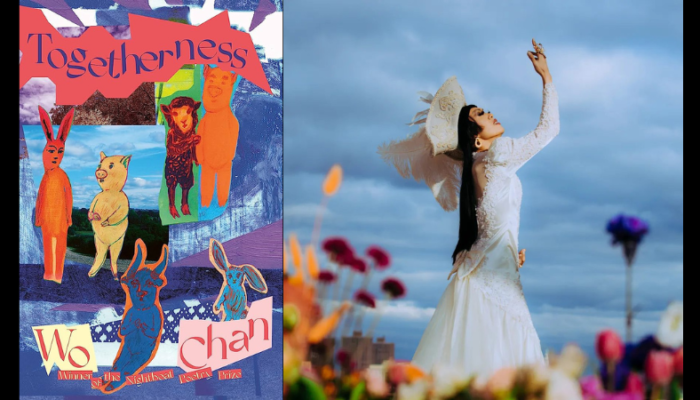In honor of Valentine’s Day, all this week on our blog we’ll be posting pieces from our January 31st reading on intercultural dating and relationships. Our second piece is by Apogee Co-Editor-In-Chief, Alexandra Watson.
You know those things your exes tell you, those things they say to break you down? Those curve balls they throw—too far inside the plate just to trick you, to throw you off guard—but meant to smash through something: splinter bone, knock you over?
He says you’re too white for him.
Correction: he says, his mother was right, you’re too white for him.
He tells you you’re too white for him, and you wouldn’t expect to be insulted by something as ridiculous as that, but then you are. After all, you weren’t all that insulted when he called you a cunt; it wasn’t that bad that time he said all your mutual friends took his side.
But he says you’re too white, and your walls come apart. They crumble, they’re splintered, and now—there’s something that was that you can’t put back together, and all that’s left is cracked plaster on the floor. And the something that was is not the relationship, because you don’t give a fuck about the relationship. No, it’s another relationship, one he shouldn’t have anything to do with: your relationship to you.
You thought you’d navigated your identity as best you could. For someone so mixed up that the question What are you? always brought genuine confusion. You thought you’d gotten to a place where your color wasn’t in question, where you could have some other primary trait, something else to define you, something else to go by.
Then he calls you too white, and you know it’s just to hurt you, but you can’t forget it. And he said his mother called you too white.
What would she know, right? What does white mean to her?
She came to the States when she was seventeen, and lived in a small apartment with a group of friends. She got pregnant by one of those friends the same year, and ended up alone, living in a car with her kid, (yeah, him), then she made her own way—lots of shitty jobs, a few bad boyfriends, more shitty jobs—until she became an administrator at a hospital, eventually an RN, sent her boy to the Ivy League, made it, made it, pulled herself up by her bootstraps.
Now she’s a Republican. You listened to he and his mother arguing over dinner: Ma, why would I vote Republican, I’m not rich. Her reply: But don’t you want to be?
She’s blonde, by the way. She has lighter skin, eyes, and hair than you do. Rubia. What does white mean to her?
American?
Are we allowed to call ourselves that? When will we be able to? When will that be a satisfying answer to, What’s your nationality? What’s your background? What’s your heritage?
You wanted to know when your ancestors got here from Ireland and Scotland, so you asked your mother, but she didn’t know. Definitely wasn’t your grandparents, they were both born in Brooklyn. Great-grandparents? Must have been. Turn of the century, that must have been it. So that makes you fourth-generation. No? Not long enough?
How far back is far enough?
Your father’s side has been here even longer. North Carolina, tobacco fields, back to plantations, there’s a path through history you must trace to get here, inevitable. We all know the path, but we don’t want to say it. Bodies for goods, bodies for money. We don’t want to face it though it’s at the core of who we are. Bodies for goods. Bodies for money.
What does white mean to her?
You don’t know everything about that past. Who does? You haven’t been on Ancestry.com. You know your grandparents sharecropped, though they don’t call it that. Your father talks about the tobacco farm as if it were their own. The kids drove the tractor through the fields, cutting down stalks, the women tied the stalks up and hung them from rafters in the barn, the men chopped them up and sent them to the RJ Reynolds factory. Some of the men, like your grandfather, worked in that factory, and that was a good job for a black man back then, he was the man around town.
Okay, you have been on Ancestry.com, but you got the free trial subscription, not the real thing where you send in your hair. The only thing you found out that you didn’t know already was how your grandfather died. Well, not exactly—not specifically how he died. Cause of death: Alcohol-related injury while at work.
You never met him.
He was very light-skinned, from the photos. His mother was full-blooded Cherokee. In the photo your father has of her, she’s wearing a skirt suit, and looks sturdy and imposing: tall, broad-shouldered, stony-faced.
When did the Cherokee get here? From where did they come? By land or by sea? There’s new evidence to support the theory that some groups of Native Americans got to this landmass by coastal routes. They say the earliest anthropological signs were found in what we now call New Mexico. How could a group have gotten across the land bridge and come all the way south through the west coast without leaving an archeological trace?
You don’t have to believe me, you can Google it. The question is: When did they get here? From where did they come?
How far back is far enough?
But no one has anything to show for it.
My father’s family worked on a farm that they talk about as if it were their own, but no one has anything to show for it.
What does white mean to her?
You might think I’m digging this topic into the ground, but I’m going to keep digging at it for the rest of my life, until I find out the answers, and the questions keep multiplying:
What does white mean?
How far back is far enough?
What does American mean?
When did they get here?
From where did they come?
What’s to show for it?
That’s the difference, isn’t it: What you have to show for your time here. Beyond stories, beyond memories… what have you built that you can call your own? Is that what makes you American? What about building the things we all share? Landmarks? Universities? Railways? Ports?
Capitalism? Imperialism? What made America so rich, anyway?
Oh, yeah. Bodies for goods, bodies for money.
When I’m in America, I’m not allowed to be American. When I’ve gone other places, I’ve been allowed to call myself American. But they still don’t take me for what I am. When I visited Florence, my friend’s Italian grandparents told me I look more European. My friend tried to explain to them that I was half-black, and they looked at me in confusion and shook their heads. “No, she’s not,” they said.
My ex’s mom comes from an outside place (you can see I’m American, I refer to all non-Americans as being from an “outside place.”) A place where I get to be American. I think that’s what she meant when she said I was too white for him. That I was too American. Too first-world; too callous and cold-hearted and pot-smoking, and non-family oriented and non-Spanish speaking, and non-salsa dancing, and non-Catholic, non-God-fearing.
She knew I wasn’t rich, so that’s what she must have meant—too American.
But when I hear that, when I hear you’re too white for me, what I hear is: You’re not down with the struggle, you don’t know what it means to be on the outside, the margins; you’re ignorant, you don’t feel the weight of history, you don’t know how good you have it.
And so I can’t forget it.




